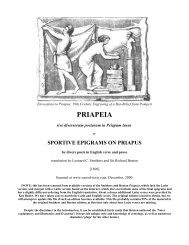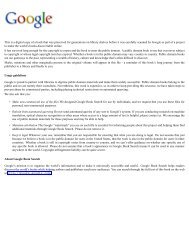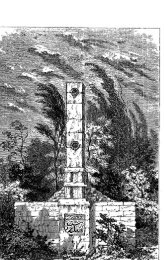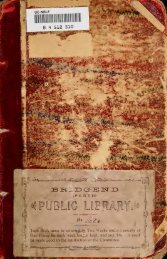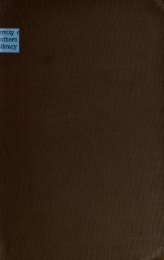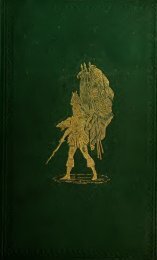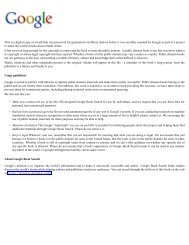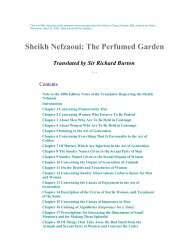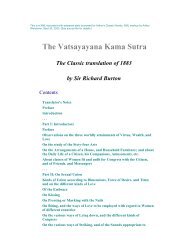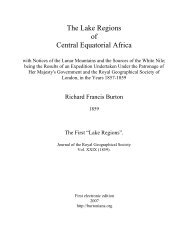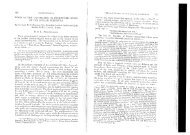- Page 2: ..869 fl!8This Vpiume Is forREFEREh
- Page 7 and 8: THELYRICKS.PART I.(SONNETS, CANZONS
- Page 9: " Wherefore I bisekke you mekely th
- Page 13 and 14: THE TRANSLATOR'S FOREWORD,I NOW sub
- Page 15 and 16: THE TRANSLATOR'S FOREWORD. 3nation
- Page 17: THE TRANSLATOR'S FOREWORD* 5the fir
- Page 20 and 21: 8 LYRICKS OF CAMOENS.Ms Dialogo Tus
- Page 22 and 23: 10 LYRICKS OF CAMOENS.Rengifo (Cap.
- Page 24 and 25: 12 LYRICKS OF CAMOENS.taken from hi
- Page 26 and 27: 14 LYRICKS OF CAMOENS.the task may
- Page 28 and 29: 1 6 LYRICKS OF CAMOENS.during his L
- Page 30 and 31: 1 8 LYRICKS OF CAMOENS.4Rhodiginus
- Page 32 and 33: 20 LYRICKS OF CAMOENS.the germ may
- Page 36 and 37: 24 LYRICKS OF CAMOENS.24 Petrus Cri
- Page 39 and 40: LYRICKS OF CAMOENS,LEm quanta quis
- Page 41 and 42: SONNETS. 27Then, if 'tis clear that
- Page 43 and 44: SONNETS. 29Lay with firm Will, with
- Page 45 and 46: SONNETS.Being in Earth-Life unto He
- Page 47 and 48: SONNETS. 33An hold my humble verse
- Page 49 and 50: SONNETS. 35But albe Disappointment
- Page 51 and 52: SONNETS. 37I live on memory-fare, a
- Page 53 and 54: SONNETS. 39Unto our Portugal, that
- Page 55 and 56: she saw the tears in beads distilSO
- Page 57 and 58: SONNETS. 43And, as your purpose 'ti
- Page 59 and 60: SONNETS. 45This wise a heart, in fr
- Page 61 and 62: SONNETS. 47But what avails me again
- Page 63 and 64: SONNETS. 49If to your lot, withal,
- Page 65 and 66: SONNETS. 51Happy that Fire who so m
- Page 67 and 68: SONNETS. 53Thee, fair-wove Fillet !
- Page 69 and 70: SONNETS. 55Ijraciousest Floret laid
- Page 71 and 72: SONNETS. 57I run to catch this welf
- Page 73 and 74: SONNETS. 59This wise I sang when Cu
- Page 75 and 76: SONNETS. 6 1But how can hap it that
- Page 77 and 78: SONNETS. 63Time clothes the country
- Page 79 and 80: SONNETS. 65Who sees the roses bloom
- Page 81 and 82: SONNETS, 67Joy that thou breddest,
- Page 83 and 84: SONNETS. 69If on thy better part of
- Page 85 and 86:
SONNETS. 71Suchwise my Ladye will m
- Page 87 and 88:
SONNETS. 73I cry :" Flee not fro' m
- Page 89 and 90:
SONNETS. 75Happy, in fine, be any,
- Page 91 and 92:
SONNETS. 77Accents that either Life
- Page 93 and 94:
SONNETS.79It is the being tane with
- Page 95 and 96:
SONNETS.& IGlad honest laughter, th
- Page 97 and 98:
SONNETS. 83Not mere conjecture this
- Page 99 and 100:
SONNETS.85,An this, in you aye sigh
- Page 101 and 102:
SONNETS. 87Thoughts ! now I view yo
- Page 103 and 104:
SONNETS. 89" Thou new-entempered Bl
- Page 105 and 106:
SONNETS. 91Be born, thou Sol serene
- Page 107 and 108:
SONNETS. 93But ay! that so much Lov
- Page 109 and 110:
SONNETS. 95What wills your Will I n
- Page 111 and 112:
SONNETS.97,Predestination doomed un
- Page 113 and 114:
SONNETS. 99A life so many Ills have
- Page 115 and 116:
Ay hostile Fortune !ay vindicativeA
- Page 117 and 118:
SONNETS.Then 'tis no fault o' mine
- Page 119 and 120:
SONNETS. 105Give back to lovely Ven
- Page 121 and 122:
SONNETS. 107Those Eyne, whose puiss
- Page 123 and 124:
SONNETS. 109Oj graduate in the scho
- Page 125 and 126:
SONNETS.IllTake heart, my heart the
- Page 127 and 128:
SONNETS. 113We fain must open paths
- Page 129 and 130:
SONNETS.. 115,But prove his potent,
- Page 131 and 132:
SONNETS. 1 1 7,Grace, Softness, Pru
- Page 133 and 134:
SONNETS. 119What ready credit heart
- Page 135 and 136:
SONNETS. 121Whoso would fare him fr
- Page 137 and 138:
SONNETS. 123What of that faith and
- Page 139 and 140:
SONNETS. 125For me the Impossible m
- Page 141 and 142:
SONNETS. 127In grace, perfection an
- Page 143 and 144:
SONNETS. 129So doth mylife -tide or
- Page 145 and 146:
SONNETS. 131Claiming a thousand mor
- Page 147 and 148:
SONNETS. 133Sped I to serve the Lig
- Page 149 and 150:
SONNETS. 135" Clear Light! obscures
- Page 151 and 152:
SONNETS.But as you leave me thus wi
- Page 153 and 154:
SONNETS. 139Then ifmy Fortune for s
- Page 155 and 156:
SONNETS. 141How better far had been
- Page 157 and 158:
SONNETS. 143The many Castles built
- Page 159 and 160:
SONNETS. 145Love with his luring sh
- Page 161 and 162:
SONNETS. 1Doffing his raiment dons
- Page 163 and 164:
SONNETS.J49Perfectest loveliness In
- Page 165 and 166:
SONNETS. 15 1Thou, Fame !upralsedst
- Page 167 and 168:
SONNETS. 153If I who hent the Pen a
- Page 169 and 170:
SONNETS. 155Now Time his order to o
- Page 171 and 172:
SONNETS. 157Then could the Twain da
- Page 173 and 174:
SONNETS. 159Let one sole marvel mak
- Page 175 and 176:
As predetermined I henceforth will
- Page 177 and 178:
SONNETS. 163And ye, gold-petaled fl
- Page 179 and 180:
SONNETS. 165Life I can lavish, or b
- Page 181 and 182:
SONNETS. 167All ! did thy coyness n
- Page 183 and 184:
SONNETS. 169And when Marfisa views
- Page 185 and 186:
SONNETS. 171Never could irous Fortu
- Page 187 and 188:
SONNETS. 173Ah ! Who shall give me
- Page 189 and 190:
SONNETS* 175I saw the figure was a
- Page 191 and 192:
But a strong Lyon, with small compa
- Page 193 and 194:
SONNETS. 179Chance led by Fortune o
- Page 195 and 196:
SONNETS.iSlWho doth the Godhead as
- Page 197 and 198:
SONNETS. 183They, who had carried o
- Page 199 and 200:
SONNETS.185Marvelleth Nature such p
- Page 201 and 202:
SONNETS.187O Tree Sublime, with mar
- Page 203 and 204:
SONNETS. 189You, of the Saintly Bre
- Page 205 and 206:
SONNETS. 191Nil! thou to forfeit fo
- Page 207 and 208:
SONNETS. 193To prize desplsal make,
- Page 209 and 210:
SONNETS. 195I stand confirmed and t
- Page 211 and 212:
SONNETS. 197Yea, trust shall fly wi
- Page 213 and 214:
SONNETS. 199Tongue ne'er attaineth
- Page 215 and 216:
SONNETS. 201The Days, with aidance
- Page 217 and 218:
SONNETS. 203But an my Fortune (to d
- Page 219 and 220:
SONNETS. 205Extremes of love-pains
- Page 221 and 222:
SONNETS. 207Thus in this net-work s
- Page 223 and 224:
The days are many since by aventure
- Page 225 and 226:
SONNETS. 21 :"O lovely Nymph ? Why
- Page 227 and 228:
SONNETS. 213" Knowst not man lullet
- Page 229 and 230:
SONNETS. 215Let not the grief that
- Page 231 and 232:
SONNETS. 217Happy was I-not-I when
- Page 233 and 234:
SONNETS. 219aJilM^ftJ^other to my s
- Page 235 and 236:
SONNETS, 221The more than natural c
- Page 237 and 238:
SONNETS.223If Will avail me aught I
- Page 239 and 240:
SONNETS. 225For self I only crave t
- Page 241 and 242:
SONNETS. 227My free-born senses the
- Page 243 and 244:
SONNETS. 229Love wills my Welfare b
- Page 245 and 246:
SONNETS. 231O lovely Nereids ! who
- Page 247 and 248:
SONNETS. 233Times, hours and moment
- Page 249 and 250:
SONNETS. 235I lost you losing all m
- Page 251 and 252:
SONNETS.237And I so tortured in thi
- Page 253 and 254:
SONNETS. 239Woe worth the day What
- Page 255 and 256:
SONNETS. 24!I must go, Ladye and fr
- Page 257 and 258:
SONNETS.Then, neither Air, with air
- Page 259 and 260:
SONNETS. 245The hand be youngest iv
- Page 261 and 262:
SONNETS.247Now that in evils be we
- Page 263 and 264:
SONNETS. 249This pine shall do me d
- Page 265 and 266:
SONNETS. 251Then shall the peoples
- Page 267 and 268:
SONNETS, 253The cause that cast her
- Page 269 and 270:
SONNETS. 255This was the intention"
- Page 271 and 272:
SONNETS. 257The Spirit joyeth happy
- Page 273 and 274:
SONNETS.259In Thee was ended dreadf
- Page 275 and 276:
SONNETS.2 6lTo hope for mighty chan
- Page 277 and 278:
SONNETS. 263Louise when shine and s
- Page 279:
SONNETS. 265Leave me, ye Stars and
- Page 285 and 286:
2ansas (Eitgfltthitr Sthrarg1 Prese



